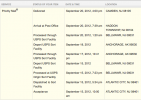The USPS is often mistaken for a government-owned corporation (e.g., Amtrak) because it operates much like a business, but as noted above, it is legally defined as an "independent establishment of the executive branch of the Government of the United States", (39 U.S.C. § 201) as it is controlled by Presidential appointees and the Postmaster General. As a quasi-governmental agency, it has many special privileges, including sovereign immunity, eminent domain powers, powers to negotiate postal treaties with foreign nations, and an exclusive legal right to deliver first-class and third-class mail. Indeed, in 2004, the U.S. Supreme Court ruled in a unanimous decision that the USPS was not a government-owned corporation, and therefore could not be sued under the Sherman Antitrust Act.[45]
The U.S. Supreme Court has also upheld the USPS's statutory monopoly on access to letter boxes against a First Amendment freedom of speech challenge; it thus remains illegal in the U.S. for anyone, other than the employees and agents of the USPS, to deliver mailpieces to letter boxes marked "U.S. Mail."[46]


